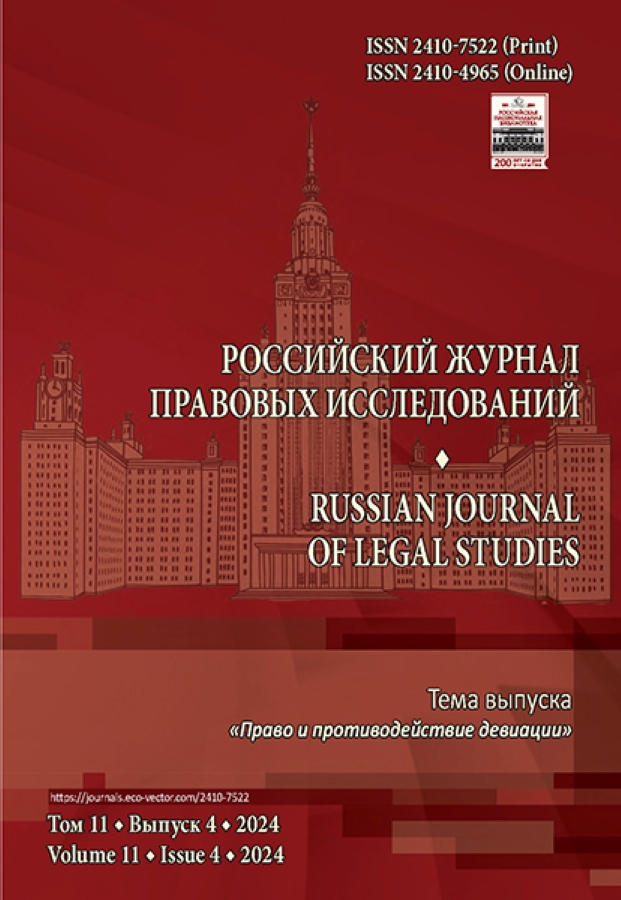Эмиссионное право в системе российского права
- Авторы: Карасева М.В.1
-
Учреждения:
- Воронежский государственный университет
- Выпуск: Том 11, № 4 (2024)
- Страницы: 47-54
- Раздел: Публично-правовые (государственно-правовые) науки
- Статья получена: 09.12.2024
- Статья одобрена: 09.12.2024
- Статья опубликована: 10.12.2024
- URL: https://journals.eco-vector.com/2410-7522/article/view/642707
- DOI: https://doi.org/10.17816/RJLS642707
- ID: 642707
Цитировать
Аннотация
В статье исследуется понятие, структура, содержание и место эмиссионного права в системе российского права. Отмечается, что эмиссионное право ― это не нормативно-правовое, доктринальное понятие. В сущности, его содержание связано с такими явлениями, как государственный суверенитет и, соответственно, суверенные права государства. Отсюда концептуальный подход к определению границ эмиссионного права должен строиться на понимании того, что эмиссионное право ― это исключительное право государства как властного субъекта, который реализует его на основе собственных императивных установлений, прежде всего, общезакрепительных правовых норм, имеющих декларативный, принципиальный характер, или же через властеотношения не частного, а публичного характера. Соответственно, в эмиссионное право не могут быть включены сопровождающие институты, а именно: наличное денежное обращение и безналичные расчеты как таковые. Но очевидно, что в структуру эмиссионного права должны быть включены нормы, устанавливающие организацию наличного денежного обращения и организацию безналичных расчетов.
В статье дано системное толкование статьи 75 Конституции РФ и ряда статей ФЗ «О Центральном банке (Банке России). Сделан вывод, что эмиссионное право ― это, прежде всего, право наличной денежной эмиссии. Оно включает в себя пять блоков правовых норм. В их числе нормы, устанавливающие: 1) денежную единицу РФ; 2) эмиссию наличных денег (банкнот и монет); 3) организацию наличного денежного обращения; 4) изъятие банкнот и монет из обращения; 5) обеспечение банкнот и монет и защиту устойчивости рубля. Кроме того, в эмиссионное право включается институт организации безналичных расчетов, который составляет шестой блок норм эмиссионного права. В этот блок включены нормы, устанавливающие правила, формы и стандарты безналичных расчетов.
В целом, эмиссионное право в системе российского права представляет собой комплексную межотраслевую правовую общность, состоящую из норм финансового, гражданского и уголовного права.
Полный текст
Об авторах
Марина Валентиновна Карасева
Воронежский государственный университет
Автор, ответственный за переписку.
Email: mvsentsova@gmail.com
ORCID iD: 0000-0002-0657-3411
SPIN-код: 9679-4429
д-р юрид. наук, профессор, заслуженный работник высшей школы РФ
Россия, ВоронежСписок литературы
- Бельский К.С. Эмиссионное право как институт финансового права // Государство и право. 2006. № 5. С. 48–52. EDN: HTEXTH
- Бельский К.С. Дополняя и развивая теорию эмиссионного права // Государство и право. 2019. № 8. С. 62–72. EDN: IEJDRU doi: 10.31857/S013207690006243-9
- Цинделиани И.А. Система эмиссионного права // Российское правосудие. 2014. № 3(95). С. 96–104. EDN: RXSGYL
- Арзуманова Л.Л. Система права денежного обращения как подотрасли финансового права в РФ / под ред. Е.Ю. Грачевой. Москва: Проспект, 2015. 128 с.
- Гудкова М.В. Денежная эмиссия и денежное обращение в РФ: особенности финансово-правового регулирования: автореф. дисс. … канд. юрид. наук. Саратов, 2021.
- Изотов Ю.Г. Предмет и система эмиссионного права Российской Федерации // Российский юридический журнал. 2024. № 3(156). С. 153–160. EDN: QWFGUS doi: 10.34076/20713797_2024_3_153
- Грибов А.Ю. Институциональная теория денег. Москва: РИОР, 2008. 199 с. EDN: QSEMNB
- Юровицкий В. Эволюция денег. Денежное обращение в эпоху изменений. Москва: Гроссмедиа, 2005. 495 с.
- Худяков А.И. Дискуссионные вопросы предмета финансового права // Финансовое право. 2009. № 3. C. 2–8. EDN: KDRNIX
- Ашмарина Е.М. Структура финансового права на современном этапе // Государство и право. 2004. № 9. C. 89–96.
- Алексеев С.С. Общая теория права. Т. 2. Москва: Юридическая литература, 1982. EDN: RLSTQN
- Матузов Н.И. Правовая политика: сущность, концепция, реальность. В кн.: Демидов А.А., Матузов Н.И., Коробов А.П., и др. Российская правовая политика. Курс лекций. Москва: Норма, 2003.
- Гейвандов Я.А. Социальные и правовые основы банковской системы РФ. Москва: Аванта+, 2003. EDN: QQDWJN
- Алексеев С.С. Структура советского права. Москва: Юридическая литература, 1975.
Дополнительные файлы








